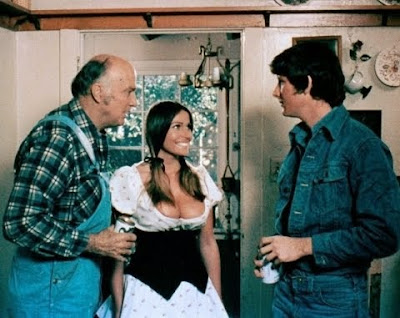The Enforcer
When Clint Eastwood pointed his .357 Magnum at San Francisco vermin in the iconic DIRTY HARRY in 1971, there was more than just the birth of a new franchise. There were reviews and essays crying "Fascism!", concerns of the portrayal of vigilantism that would bring cheers from those who act more from their gut than their brain. Those just looking for violent action and satisfying payback. The screenplay championed a possibly sociopathic misanthrope who cared little about Miranda rights. Sociologists found much fascination in the Harry Callahan character. Many fans indeed merely saw a guy who took out the trash. Someone who bucked the law to take care of those the System let off. Real justice.
1974's MAGNUM FORCE, as I've written before, seemed to be a response to that criticism. Its plot centered around a circle of young cops who form a secret society of vigilantes, taking orders from the chief of police. The dangers of their ways is insightfully examined in John Milius' script. Harry remains a lone wolf who puts down the lowlifes in his own violent manner (and forever gets reamed out by superiors because of it), but is also shown as a concerned voice as he slowly catches on to the cops' and chief's activities. Frontier justice was now shown as a dilemma.
By 1976, the Dirty Harry character was the stuff of legend. Too bad THE ENFORCER is a somewhat tepid entry in the series, though with some good ideas and effective scenes. Timely as well, involving a plot torn from the Patty Hearst headlines of the day. An SLA-type group stages robberies around the Bay Area that get a lot of people killed. Meanwhile, Harry is given a female partner named Kate Moore (Tyne Daly) after his ultra violent methods (check that classic liquor store bit) finally get him demoted to Personnel, a department that Callahan believes is "for assholes." This comment adds nothing positive to his shaky relationship with the police Captain (Bradford Dillman).
Does the screenplay lay on the affirmitive action angle too thick? In an effort to be "with it" and "contemporary"? Nah, there's far more rough action and violence than preachiness, though Daly gets in some good lines in her conversations with her partner and even a group of Black Panther type militants, led by "Big" Ed Mustapha (Eastwood reg Albert Powell), who will figure significantly into the plot. Clint does his thing with confidence and quiet swagger all the way through, and that's what people paid to see, not a thoughtful social document. But then you keep thinking about that first film, how it somehow managed to be both things......



Comments